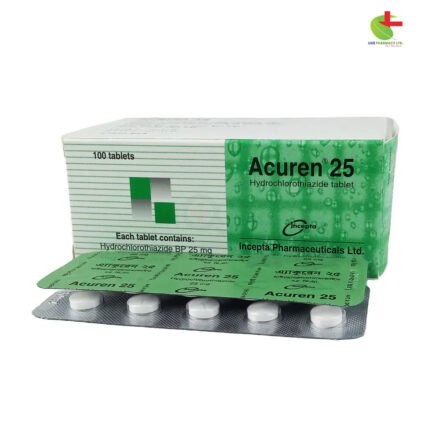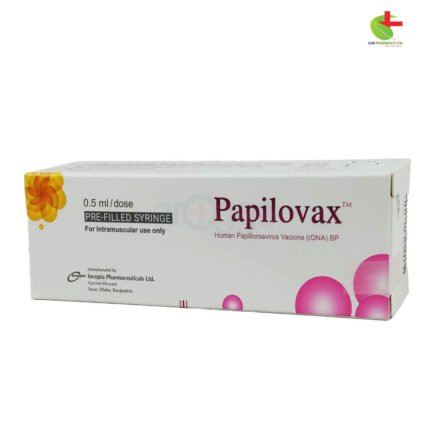Acuren 50
10.00৳ Strip
- Acuren is a thiazide diuretic used for managing edema from congestive heart failure, hepatic cirrhosis, and renal dysfunctions.
- Effective in treating hypertension, either alone or with other antihypertensive medications.
- Inhibits sodium and chloride reabsorption in the kidneys, promoting fluid loss and vasodilation.
- Consult a healthcare professional for appropriate use and dosage.
 Brand
Brand
|
Incepta Pharmaceuticals Ltd |
|---|---|
 Generics
Generics
|
Hydrochlorothiazide |
 Type
Type
|
Tablet |
Indications
Acuren is indicated for managing edema related to congestive heart failure, hepatic cirrhosis, premenstrual tension, and various renal dysfunctions (e.g., nephrotic syndrome, acute glomerulonephritis, chronic renal failure). It is also used for hypertension, either alone or in combination with other antihypertensive medications. Consult a registered physician before using this medication.
Pharmacology
Hydrochlorothiazide, a thiazide diuretic, facilitates fluid loss by inhibiting sodium and chloride reabsorption in the distal convoluted tubules of the kidneys. It may lead to potassium depletion and increased serum uric acid levels. While thiazides are commonly prescribed for hypertension, their hypotensive effects are not solely attributed to diuresis. These medications also induce vasodilation through the activation of calcium-activated potassium channels and inhibition of certain carbonic anhydrases in vascular tissues.
Dosage & Administration
For edema, start with 25 to 50 mg daily; adjust for maintenance if possible, with a maximum of 100 mg daily. For hypertension, the initial dose is 25 mg daily, which can be increased to 50 mg if needed. In the elderly, an initial dose of 12.5 mg daily may suffice. For children, begin with 1 to 2 mg per kg of body weight in two divided doses; infants under 6 months may require up to 3 mg per kg daily. Consult a registered physician before using this medication.
Interactions
Co-administration with alcohol, barbiturates, or narcotics may enhance orthostatic hypotension. Adjustments may be necessary for oral and parenteral antidiabetic drugs, and other antihypertensives may have an additive effect. Discontinuing diuretics 2-3 days before starting ACE inhibitors can help mitigate first-dose hypotension.
Contraindications
Not to be used in patients with anuria, hypersensitivity to Hydrochlorothiazide or sulphonamide drugs, severe renal or hepatic failure, Addison’s disease, hypercalcemia, or those on concurrent lithium therapy.
Side Effects
Common side effects include gastrointestinal issues (anorexia, nausea, vomiting, cramps), central nervous system effects (dizziness, headache), and potential hematological issues (leucopenia, thrombocytopenia). Cardiovascular effects may include hypotension. Monitor for electrolyte imbalances and other symptoms. Adjust dosage or discontinue if severe side effects occur.
Pregnancy & Lactation
Thiazides cross the placental barrier; use during pregnancy must weigh benefits against risks to the fetus, including jaundice and thrombocytopenia. If deemed essential during breastfeeding, the patient may need to cease nursing.
Precautions & Warnings
Monitor for signs of fluid and electrolyte imbalances, including symptoms like weakness and muscle cramps. Hypokalemia can exacerbate the effects of digitalis. Use potassium-conserving agents if needed, and exercise caution in patients with impaired renal or hepatic function.
Overdose Effects
Signs of overdose may include electrolyte depletion and dehydration due to excessive diuresis. Management involves symptomatic treatment, possibly including gastric lavage.
Therapeutic Class
Thiazide diuretics and related medications.
Storage Conditions
Store below 30°C, away from light and moisture, out of reach of children.













Reviews
There are no reviews yet.